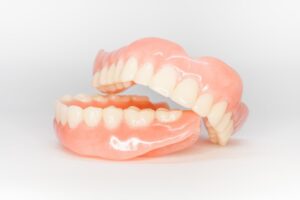
Wearing dentures can restore your smile, help you chew properly, and improve your confidence. However, many denture wearers, especially those with lower dentures, experience frustrating issues with movement and instability. If your lower denture won’t stay in place, you’re not alone. This is a common problem, and fortunately, there are solutions. Understanding the reasons behind this issue is the first step toward a more comfortable and secure fit.
Anatomy Makes Lower Dentures Harder to Stabilize
Upper dentures tend to stay in place more easily because they cover a large surface area and create suction with the roof of the mouth. Lower dentures, on the other hand, rest on the lower jaw, which is smaller and lacks the same suction-friendly surface. Additionally, the tongue and floor of the mouth are constantly moving, making it easier for the lower denture to become dislodged.
Bone Loss Over Time
After teeth are removed, the jawbone begins to shrink in a process known as resorption. Over time, this bone loss can dramatically alter the shape of your jaw and gums, leaving your denture with less of a stable foundation to grip onto. The more bone you lose, the harder it becomes for a traditional denture to stay in place, especially in the lower jaw.
If your dentures used to fit well but have become loose over time, bone loss could be the culprit.
Poor Fit or Old Dentures
Denture materials can wear down, and your gums and jaw continue to change shape throughout your life. If your lower denture is several years old, it may simply not fit your mouth as well as it once did. Dentures that no longer match your anatomy can rock, slip, or even cause sore spots.
If you’re dealing with ongoing discomfort or movement, it might be time for a denture reline or replacement.
Lack of Saliva
Dry mouth, a condition known as xerostomia, is common among older adults and can interfere with how well your denture stays in place. While this is more of an issue for upper dentures, dry mouth can also affect how secure your lower denture feels. Without adequate saliva, the natural suction and lubrication your mouth provides are compromised.
Certain medications, dehydration, or health conditions like diabetes can contribute to dry mouth.
Solutions to Consider
If you’re struggling with a loose lower denture, talk to your dentist about your options. Solutions might include:
- Denture adhesives: Temporary, but may help improve stability.
- Denture reline: A cost-effective way to improve fit.
- Implant-supported dentures: A permanent and secure solution using dental implants to anchor your denture.
Implant-retained lower dentures are especially effective and are often recommended for patients who can’t keep their lower dentures in place.
A loose lower denture is more than an inconvenience – it can affect your speech, ability to eat, and self-esteem. Whether it’s due to anatomy, bone loss, or wear and tear, there are modern solutions that can restore your comfort and confidence. Don’t suffer in silence. Your dentist can help you find a more secure, lasting fit.
About the Practice
Having troubles with your denture fitting? Or are you interested in getting an artificial replacement? Whatever your needs are, Plaisance and Bostick Family Dentistry has you covered! Our sturdy, long-lasting materials mean that our appliances endure, and if you’re considering implant dentures, know that we have them placed by a specialist. With convenient, flexible financing options available, we can help lessen the worry of paying for your treatment. If you have denture needs, schedule an appointment online or call us at (504) 738-5171.
